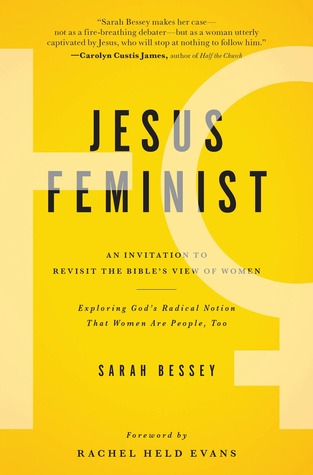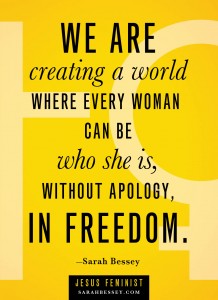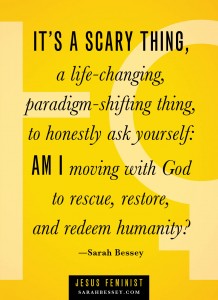
Jesus Feminist. It took me months to get through this book – not because it was a difficult read, but because it was a great one. I would read up to a point, and then I’d have to set it down and just think about it for awhile. And then life would happen. And then I’d pick it up again – but I’d start over, to remind myself of what I’d already read.
I finally made it from cover-to-cover the third time through – due in large part to a road trip followed by a lengthy round-trip flight – with layovers for thinking time.
 To some of us, it seems like a no-brainer. Of course women are people, too. Who would question that?
To some of us, it seems like a no-brainer. Of course women are people, too. Who would question that?
And yet there are places in the world (and even in your hometown) where women are treated as servants, slaves, objects, animals. They are considered less than. And it’s not right.
And it’s why equality – and saying something about it – matters.
Sarah Bessey’s Jesus Feminist is a delightful blend of her own personal stories and a balanced theological discussion of the biblical worldview regarding women. She takes on myths perpetuated by church culture with grace and compassion, and challenges her readers to a better hermeneutic, one rooted in Scripture and not in its cultural adaptations.
Additionally, she makes a convincing argument that biblical feminism and social justice are undeniably and irrevocably intertwined. You cannot have one without the other.
Which makes differentiating the sort of feminism the Bible talks about from other brands of feminism incredibly important.
 So what is a “Jesus Feminist”? Bessey argues that “Jesus Feminists” view women the way Jesus viewed them: as people, valuable in their own right simply by virtue of having been created – on purpose, in the image of God, and in order to image Him to a broken world.
So what is a “Jesus Feminist”? Bessey argues that “Jesus Feminists” view women the way Jesus viewed them: as people, valuable in their own right simply by virtue of having been created – on purpose, in the image of God, and in order to image Him to a broken world.
Women were not created to be less than men; they were never meant to be treated as second-class citizens in the kingdom of God. Every woman on this planet was created with and for a purpose, by a God who loves them tremendously.
We were created on purpose!
For some of us, that will mean going – into the places where injustice and intolerance yet reign, to stand alongside our sisters in solidarity and support. For some of us it will mean speaking up – recognizing that the first step to solving a global problem in redeeming the role of women in our societies is admitting that there is a problem, and that we need to do something about it. And for some of us it will mean stepping out – into callings we thought God couldn’t possibly have for us. Because we thought women were less than, too. And we were wrong.
Jesus Feminist is a gift to the church. Regardless of where you stand politically, theologically, or ideologically in regards to feminism as it relates to the Church – I hope you’ll give this book a fair chance. It is brimming with encouragement, hope, and vision.
This one might be an annual re-read.
The statements made and opinions expressed here are solely those of the authors and do not necessarily reflect the views and opinions of any current or former employers.
